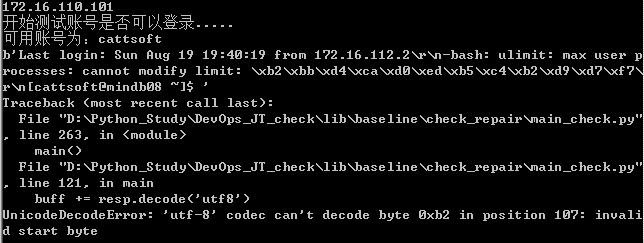接上一篇,前两篇解决中文的问题主要是在字符集上做的手脚,即将中文转成英文,但是有一种情况我们都来不及做转换,即登录时服务器直接返回了中文内容:

此时程序报了如下错误,其实还是字符集问题:

为此:我们可以在接收数据的时候直接对其进行异常捕捉,如果异常则换一种解码方式:
def verification_ssh(host,username,password,port,root_pwd,cmd): s=paramiko.SSHClient() s.load_system_host_keys() s.set_missing_host_key_policy(paramiko.AutoAddPolicy()) s.connect(hostname = host,port=int(port),username=username, password=password) if username != 'root': ssh = s.invoke_shell() time.sleep(0.1) #先判断提示符,然后下一步在开始发送命令,这样大部分机器就都不会出现问题 buff = '' while not buff.endswith('$ '): resp = ssh.recv(9999) try: #进行异常捕捉,如果解码有问题,则换一种解码方式 buff += resp.decode('utf8') except Exception as e: buff += resp.decode('gb18030') print(resp) time.sleep(0.1) print('获取登录后的提示符:%s' %buff) ssh.send(' export LANG=en_US.UTF-8 \n') #解决错误的关键,编码问题 ssh.send('export LANGUAGE=en \n') ssh.send('su - \n') buff = "" while not buff.endswith('Password: '): #true resp = ssh.recv(9999) print(resp) buff +=resp.decode('utf8') print('hhhhh') print(buff) ssh.send(root_pwd) ssh.send('\n') buff = "" # n = 0 while not buff.endswith('# '): # n += 1 resp = ssh.recv(9999) print(resp) buff +=resp.decode('utf8') # print(n) # if n >=3: # break # print(buff) ssh.send('sh /tmp/check/101.sh') #放入要执行的命令 ssh.send('\n') buff = '' # m = 0 while not buff.endswith('# '): resp = ssh.recv(9999).decode() buff +=resp # m += 1 # print(m) result = buff # print(type(result)) # print(result) s.close() if __name__ == "__main__": verification_ssh('测试IP地址', '普通账号', '普通账号的密码', '52222', 'root密码', 'id')
上一篇:ssh.invoke_shell() 切换root出现的新问题
注:转载请注明出处







 本文介绍了一种解决SSH登录时遇到的中文字符集问题的方法。通过使用异常捕捉及多种解码方式,确保了不同环境下中文内容的正确显示。
本文介绍了一种解决SSH登录时遇到的中文字符集问题的方法。通过使用异常捕捉及多种解码方式,确保了不同环境下中文内容的正确显示。
















 824
824

 被折叠的 条评论
为什么被折叠?
被折叠的 条评论
为什么被折叠?








